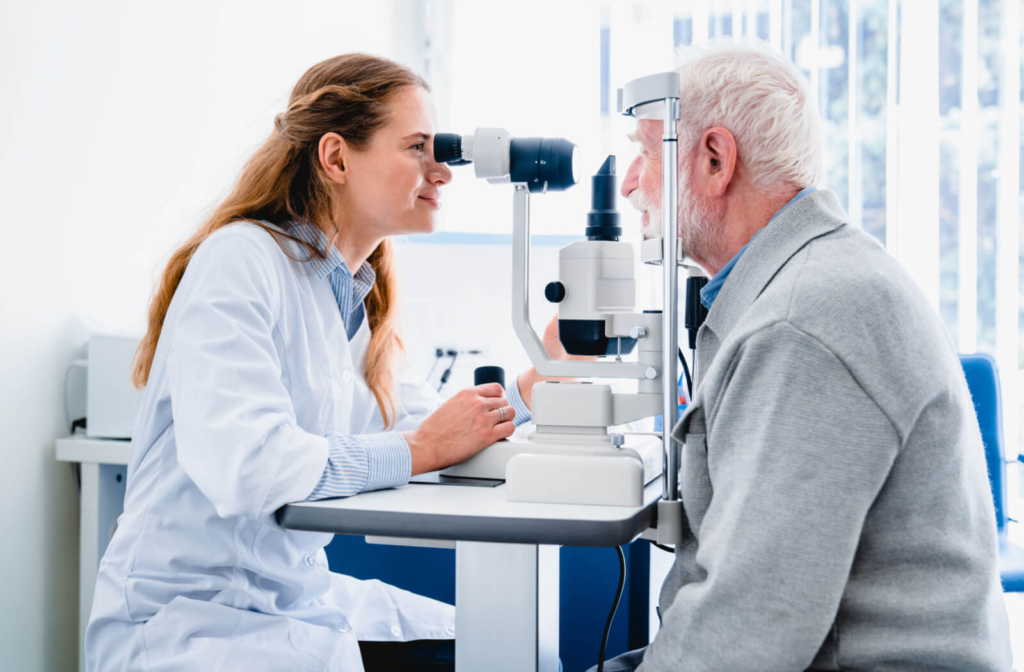Age-related macular degeneration (AMD) is a complex eye condition influenced by a variety of factors. Macular degeneration can be hereditary and has genetic connections, but there are also other contributing factors, such as age, smoking and exposure to UV light.
In this blog post, we will explore the role of genetics and other risk factors in the development of macular degeneration, as well as laser surgery treatments eye care professionals can use to help prevent and slow the progression of AMD.
What Is Macular Degeneration?
Age-related macular degeneration (AMD) is a serious condition that affects the center of your retina, leading to the loss of central vision and the ability to see fine details. There are two types of AMD: Dry AMD and wet AMD.
- Dry AMD is more common and occurs as the macula thins with age, causing small protein deposits to form. Currently, there is no cure or treatment for dry AMD.
- Wet AMD is less common but can be more serious. It causes abnormal blood vessels to grow under the macula, leading to rapid vision loss.
Does Genetics Play a Role in AMD?
Genetics can play a significant role in AMD. While age, diet, and smoking can also contribute to the risk of developing this condition, certain genetic factors can significantly influence the onset and progression of AMD in individual patients.
For example, those with a family history of AMD may be more likely to develop the condition. Additionally, certain genetic backgrounds can also increase your risk of developing AMD.
Other Risk Factors
Genetics is not the only consideration for AMD risk. Other factors that can increase the risk of developing AMD include:
- Age
- Smoking
- High blood pressure
- Exposure to UV light
- Risk factors for obesity

Prevention and Treatment
Treatment options for macular degeneration vary depending on the stage and type of the condition.
While there’s no specific treatment for early AMD, maintaining a healthy diet, exercising regularly, and quitting smoking can significantly improve your eye health.
For intermediate and advanced stages of the disease, dietary supplements, injections, and photodynamic therapy (injections and laser treatment) can help slow the condition’s progression and support your vision. However, photodynamic therapy is no longer a common treatment for wet AMD as different intravitreal injection types have proven to offer better prevention of vision loss and some recovery.
How Laser Surgery May Help
Laser surgery is not a common option for individuals suffering from AMD. As mentioned above, in wet AMD, currently intravitreal injections have proven beneficial.
Laser photocoagulation, a specific type of laser aimed at blood vessels, can help seal these abnormal blood vessels in the retina and prevent further leaking. While it is not a cure for AMD, it may reduce symptoms and prevent total vision loss. These treatments are not frequent and would be carried out by a retina specialist.
For select patients with wet AMD, laser treatments may be a particularly effective option. A referral to a retina specialist for evaluation would be an initial step for best care in a patient with wet AMD.
Take Control of Your Eye Health with Vector Eye Centre
Macular degeneration is a complex condition with many contributing factors. Hereditary factors are one potential cause, but other risk factors, such as age, smoking, and UV exposure, must also be considered.
Fortunately, medical advancements have made it possible to detect and manage macular degeneration early. Vector Eye Centre helps treat macular degeneration and support your vision. We work closely with our local retina specialists to offer best care. Our experienced team is dedicated to helping you manage serious eye diseases and other ocular conditions.
Contact Vector Eye Centre to learn more about how we can help. Together we can work toward a bright future for your eyes!



